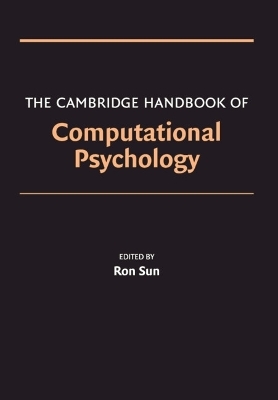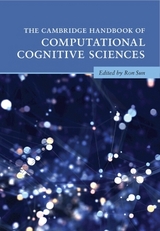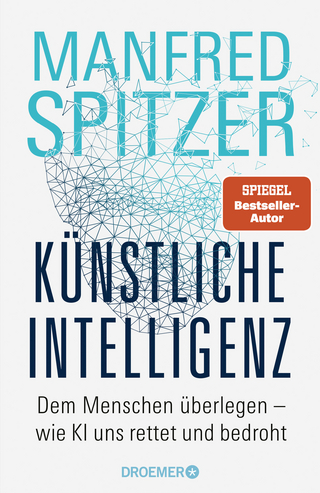
The Cambridge Handbook of Computational Psychology
Cambridge University Press (Verlag)
978-0-521-85741-3 (ISBN)
- Titel erscheint in neuer Auflage
- Artikel merken
This book is a definitive reference source for the growing, increasingly more important, and interdisciplinary field of computational cognitive modeling, that is, computational psychology. It combines breadth of coverage with definitive statements by leading scientists in this field. Research in computational cognitive modeling explores the essence of cognition and various cognitive functionalities through developing detailed, process-based understanding by specifying computational mechanisms, structures, and processes. Given the complexity of the human mind and its manifestation in behavioral flexibility, process-based computational models may be necessary to explicate and elucidate the intricate details of the mind. The key to understanding cognitive processes is often in fine details. Computational models provide algorithmic specificity: detailed, exactly specified, and carefully thought-out steps, arranged in precise yet flexible sequences. These models provide both conceptual clarity and precision at the same time. This book substantiates this approach through overviews and many examples.
Dr. Ron Sun is Professor of Cognitive Science at Rensselaer Polytechnic Institute. A well-known researcher in the field of cognitive science, Sun explores the fundamental structure of the human mind and aims for the synthesis of many interesting intellectual ideas into one coherent model of cognition. The goal is to form a generic cognitive architecture that captures a variety of cognitive processes in a unified way and thus to provide unified explanations for a wide range of cognitive data. To do so, for the past two decades, he has been advocating the use of hybrid connectionist-symbolic systems in developing cognitive models and he has been developing theories of human skill learning and human everyday reasoning as the centerpieces of the cognitive architecture.
Part I. Introduction: 1. Introduction to computational cognitive modeling Ron Sun; Part II. Cognitive Modeling Paradigms: 2. Connectionist models of cognition Michael Thomas and James McClelland; 3. Bayesian models of cognition Thomas Griffiths, Charles Kemp, and Joshua Tenenbaum; 4. Dynamical systems approaches to cognition Gregor Schoener; 5. Declarative/ logic-based computational cognitive modeling Selmer Bringsjord; 6. Constraints in cognitive architectures Niels Taatgen and John Anderson; Part III. Computational Modeling of Various Cognitive Functionalities and Domains: 7. Computational models of episodic memory Kenneth Norman, Greg Detre, and Sean Polyn; 8. Computational models of semantic memory Timothy Rogers; 9. Models of categorization John Kruschke; 10. Micro-process models of decision making Jerome Busemeyer and Joseph Johnson; 11. Models of inductive reasoning Evan Heit; 12. Mental logic, mental models, and simulations of human deductive reasoning Philip Johnson-Laird and Yingrui Yang; 13. Computational models of skill acquisition Stellan Ohlsson; 14. Computational models of implicit learning Axel Cleeremans and Zoltan Dienes; 15. Computational models of attention and cognitive control Nicola De Pisapia, Grega Repov and Todd Braver; 16. Computational models of developmental psychology Thomas Shultz and Sylvain Sirois; 17. Computational models of psycholinguistics Nick Chater and Morten Christiansen; 18. Computational models in personality and social psychology Stephen Read and Brian Monroe; 19. Cognitive social simulation Ron Sun; 20. Models of scientific explanation Paul Thagard and Abninder Litt; 21. Cognitive modeling for cognitive engineering Wayne Gray; 22. Models of animal learning and their relations to human learning Francisco Lopez and David Shanks; 23. Computational modeling of visual information processing Pawan Sinha and Benjamin Balas; 24. Models of motor control Ferdinando Mussa-Ivaldi and Sara Solla; Part IV. Concluding Remarks: 25. An evaluation of computational modeling in cognitive science Margaret Boden; 26. Putting the pieces together again Aaron Sloman.
| Erscheint lt. Verlag | 28.4.2008 |
|---|---|
| Reihe/Serie | Cambridge Handbooks in Psychology |
| Verlagsort | Cambridge |
| Sprache | englisch |
| Maße | 184 x 260 mm |
| Gewicht | 1470 g |
| Themenwelt | Geisteswissenschaften ► Psychologie ► Allgemeine Psychologie |
| Geisteswissenschaften ► Psychologie ► Verhaltenstherapie | |
| Geisteswissenschaften ► Sprach- / Literaturwissenschaft ► Sprachwissenschaft | |
| Informatik ► Theorie / Studium ► Künstliche Intelligenz / Robotik | |
| ISBN-10 | 0-521-85741-4 / 0521857414 |
| ISBN-13 | 978-0-521-85741-3 / 9780521857413 |
| Zustand | Neuware |
| Haben Sie eine Frage zum Produkt? |
aus dem Bereich



